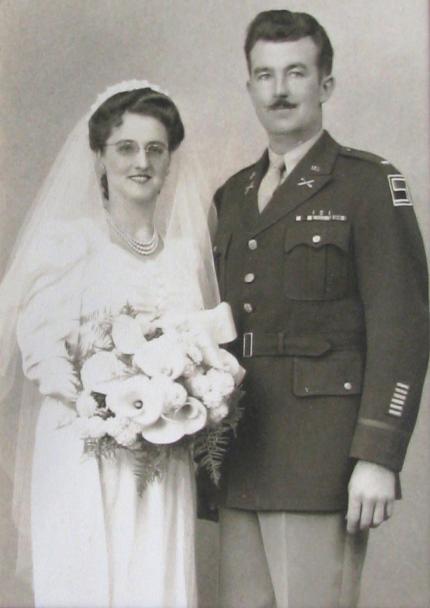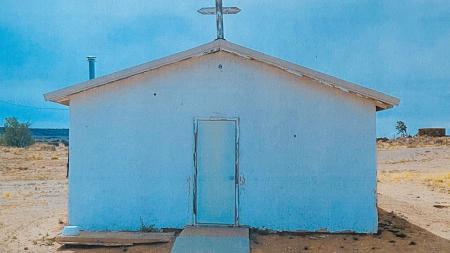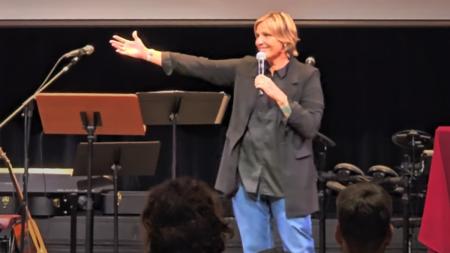Remembering D-Day: John Van Til

To mark the 75th anniversary of the D-Day invasion, when Allied troops landed in Normandy, France, on June 6, 1944, CRC News published a story last week on George St. Cyr, a member of Heritage Christian Reformed Church in Brampton, Ont., who was among the soldiers who landed in Normandy. This week, CRC News includes the accounts of two other soldiers who made the landing 75 years ago this Thursday.
John Van Til entered the army in 1942, and after basic training he did officers’ training in Shrivenham, England, as a second lieutenant in the 110th field artillery battalion of the U.S. Army, landing on Omaha Beach on D-Day. He received two battle citations for valor and was promoted to first lieutenant. The following artifacts include a letter to his future wife, Alice Van Baren, written on May 24, 1944, from somewhere in England; excerpts from his journal recounting the D-Day invasion; and, finally, a letter he wrote to his family. He used long German stationery found on the battlefield for writing in the journal. The letters here have been lightly edited by his daughter, Thea van Til Rusthoven. Words in brackets are hers. Otherwise, in order to maintain their authenticity, the letters appear here as he wrote them.
The first is a letter to his future wife, Alice Van Baren:
25 May 44
My dear Alice,
Another opportunity to have a short talk with you Alice. It has been said by a soldier in N. Africa according to the now famous Indiana correspondent Ernie Pile [sic], “A letter from home is like a five minute furlough.” I hope you find my letters little furloughs of myself to you. You are my beloved and my joy and expectation Alice. Quoting again, “Kindly remember this.” If you were with me now I know what you would say. You would embrace me and kiss me, yes you would Alice and say, “John I love you. Your job is dangerous and most difficult, but with God’s help and in His strength I know you will do your duty.”
Thus you would encourage me now. I would say, “Yes so it will be for I know our cause is just and I will listen to my Lord for His will, His correction and guidance. Then I would embrace you and look into your eyes and take with me a memory of you until I returned D.V. [“God willing”]
Love, John
The following journal entries describe John’s experiences on June 6-7:
France 6 June 44
The great D-Day, the day the Allied Army broke through the strong defenses of Western Europe on the Normandy beaches warrants description and recording before the terror and commody [sic -- camaraderie?] with its implications be forgotten to all, save those who drank the cup of suffering.
My personal account will be different from 99 per cent of all other personal accounts. First of all there is hardly one man of a hundred who holds the world and life view that I cherish. This would not change the fact[s] but would change the general interpretation of these facts.
Sailing toward the beaches on D-Day seemed pleasant enough. That is we weren’t suffering physically at least. The ocean was blue; the sky was grey. Nothing unnatural here, we thought, as we skimmed along.
At times we would go on deck to see land if possible. Would the French coast look like the air photographs, the sketches and the maps we had studied?
To either side of our LCIL [Landing Craft Infantry Light], were scores of ships as far as the eye could see. We were told many more lay beyond these. Where were the deadly E boats and the U boats of the German navy? Allied fighter planes were almost continually in sight overhead or to the flanks.
Word was given by the captain of the ship that we would land in approximately one hour. One hour more and we would be in France. Apparently no one aboard ship doubted that. Hadn’t we trained for months? Year into years rolled the time. We had landed many times before in practice but always on the friendly shores of old England.
The men on our boat consisted of a headquarters company, a heavy weapons company, an artillery liaison group, an artillery reconnaissance group, an artillery forward observation group, a chaplain and the colonel of the battalion which our infantry was supporting.
The craft was circling offshore. In the distance we could see the outlines of the French coast none too clearly because the battle was raging for several hours and dense smoke was obstructing a distant view.
The explosion of naval shells bursting on the beach defense became louder and louder as we made the run to land. Every man had his lifebelt securely fastened under his arms next to his body, under his equipment. Everyone was weighed down with countless items of assaulting tools.
We were virtually beast[s] of burden as we filed on deck waiting for the ramp, one on either side to be lowered. My pack contained toilet articles, a change of light and heavy under socks, trench coat, three days rations, two heavy radio batteries, each about 12 lbs, one reel 130 wire about 15 lbs, binoculars, gas mask, gas cape, one 536 walkie-talkie radio, map case, compass, pistol, extra ammunition and a small heating unit.
When the ramps were lowered we were only 25 yards offshore, much to our surprise. It was already H+5 Hours and the first wave of infantry had gone in, we were told. We soon realized that the first wave hadn’t cleared our particular beach and we were now at war personally for the first time.
We unloaded quickly into five feet of water, grasping the lifeline in one hand. The high wave washed overhead and pushed us ashore before anyone had time to think about deep tunnels or underwater obstacles.
Chapter Two. The Fight to Gain a Hold
The terrible scene we beheld now almost defies description. It wasn’t as bad as we had expected, however. We were so gripped by the one passion to gain a hold and push inland rapidly that nothing stopped us. Men and machine lay side by side hid behind the natural breakwater. Some of the men were dead. Most of them alive, awaiting a chance to clear this first protection and reorganize in a very small swamp before pushing up the first ridge only 100 yards inland. The tanks were immobile, parked along the ocean side of the breakwater as ants along a narrow street. A couple of bulldozers were breaking down this sand and gravel barrier. The drivers seemed unaware of his [sic] peril. Heroes they are.
Artillery shells from shore were bursting behind our LCIL and mortar and machine gun fire was directed at us.
The members of my reconnaissance party were accounted for. My job was to move along with the leading elements of the infantry and when they had pushed the Jerries back as far as our predetermined gun position, we were to inspect the area for mines and booby trap[s] and pick out the exact spot each gun would be place[d], then send a guide back to the beach to lead the battery in. The guns did not arrive in this pre-selected place until three days later. They should have been in H+12. Meanwhile we fought as infantry, so here is the story of those three days.
Achtung Minen [Attention! Mines!]
Our greatest difficulty for the first few hundred yards was mines: anti-personnel. In haste to move forward the infantry could not take time to clear every inch of the ground of mines. Consequently I told my men to walk only on the paths they made. As we proceeded up the hill we heard explosions and another Doughboy [U.S. soldier] would lay beside the path with a foot blown to bits. Our reaction was to keep to the paths at all times.
After the infantry had gained the first ridge they spread out along hedgerows and began working their way further inland and a great deal to the right. Our party and adjoining groups were recovering from our first artillery shelling. Many of us thought little of it because very few casualties were sustained.
Hard fighting soon began. Capt. Smit, CO of leading company, was a casualty. Snipers were everywhere. The infantry pushed forward to the first small town, taking some prisoners on the way. In the town the snipers were well placed and we were pinned down every once in a while. Some very troublesome snipers were located in the church tower about 300 yards to our front. Capt. Mann called in the navy. No one living heard such explosions so close. We thought the tower fell but before we moved on many others held up our advance.
All this time, now several hours since landing, our party carried the heavy packs which included the very heavy and clumsy 610 radio batteries. Before we cleared the town, a sniper put a bullet through the 536 radio I was carrying.
Now our own artillery had no place to land. We hadn’t made room for them by D night. However, a battery of M7s were on shore and our Bn [Battalion] CO, Colonel P. Cooper Jr., requisition[ed] these M7s to support our infantry. Communication was the big problem since many of our radios through the landing operation and subsequent battle became unserviceable. We used wire and telephone. It was a relief to get rid of the extra wire. D night we found ourselves but a small way inland, perhaps 1000 yards. We were surrounded with snipers and as we dug our first foxholes, snipers had us covered.
D+1
On the morning of D+1 we pushed forward a few hundred yards or more. Everyone was tired to the very marrow, but we had to push on. Sometime around noon our own tanks arrived. There were so many German and American troops so close together that our tank[s] had to fight their way to us.
When they [the Americans] arrived, the first one opened fire on us. No one was hurt because we had learned to duck into our holes very quickly. As soon as the tank CO saw clearly our identity, he group[ed] his company of tanks in our rear, ready to give us some [cover] for the attack the following morning.
From somewhere in Germany, John Van Til wrote this letter to his family exactly one year before his wedding to Alice:
23 Nov 44
Dear Ones,
A few days ago while up forward in the attack one of our linesman brought up the mail at night. I crouched in my slit trench at daybreak to read the good news from home. Strangely enough home seemed quite close by even in a shell torn field in Germany. I think it was because our God was very near me that day. The fierceness of the fighting beats anything I had seen to date and that’s covering quite a bit of territory. Before going into the attack I called my party together and we ask[ed] God to give us good success and spare our lives if it was His will. Then we put our helmets back on and went forward with a peace in our hearts that only a child of God can know. Although my small radio was hit four times and members of my party had bullet holes through some loose clothing all of us came back. For four days we were subjected to intense German artillery and mortar fire plus plenty of machine guns. . . .
Tomorrow is Thanksgiving Day. I will be able to attend the service. Our hearts will be united in communion and thanksgiving for all our blessings. Let us pray for victory and peace. What a welcome sight it would be in the midst of battle to see Christ return. How puny man’s stature is before the God of all the earth. How precious are His promises. The words of my favorite song often come to my mind in the thick of the fight, “The Lord is my light and my salvation, whom shall I fear? The Lord is the light of my life, of whom shall I be afraid?” and the words of the song “Trust and Obey for there’s no other way to be happy in Jesus but to trust and obey.”
I’m feeling fine and fit. Please don’t worry about me at all. I’m happy for His eye is on the sparrow and I know he watches me.
Love, John
John Van Til taught music and band in Christian schools in the Chicago area most of his life and sang in various CRC churches for many years. Alice Van Til taught for 40 years in various Christian schools, mostly at Lansing Christian School in Illinois. They were longtime members of First CRC in Lansing, Ill.
Used by permission of Thea van Til Rusthoven and her brother and sister -- John Van Til and Esther Hayman.


